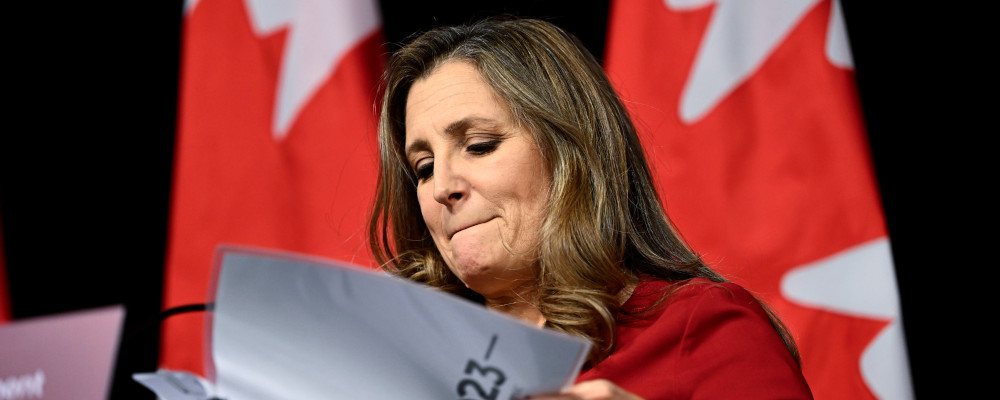After a challenging 2023, Prime Minister Justin Trudeau and Finance Minister Chrystia Freeland head into the new year facing significant pressure to test further the reach of the federal government’s balance sheet.
Just to stay in power, the federal government will likely need to launch a multi-billion pharmacare plan to fulfill a promise that it made to the New Democratic Party. A federal election, whenever it comes, will only stoke demands for additional spending. Adding to the pressure are structural challenges around aging, industrial policy, defence, Indigenous reconciliation, and the energy transition.
As a result, the next 12 to 18 months will see heightened debate over the state of the nation’s finances, as well as the amount of fiscal space that remains available and how best to use it.
We believe the federal government should resist any temptation to add to the fiscal framework at a time when debt has ballooned, interest rates have increased, and growth has slowed. Others will take a more sanguine view. Political actors will work hard to frame the discussion strategically to rally the public around their positions.
To help inform the coming debate, we offer a few observations that we think are worth highlighting.
Net debt
Let’s start with a reminder that there are a number of ways to measure debt and sustainability. Under the government’s preferred gauge—net debt—Canada’s fiscal position looks much better than most major economies—a fact that the current government has raised repeatedly to justify its spending.
But it has limitations.
Net debt is a narrow measure that deducts state financial assets from actual debt liabilities. In Canada’s case, this includes the fast-growing assets held by the Canada Pension Plan and the Quebec Pension Plan. The fundamental idea is that it’s the best way to assess longer-term solvency since, in theory, the government can tap into these financial assets to repay its debt if needed.
The concept is somewhat notional, however, since it’s tough to see any government raiding the nation’s pension assets even in a crisis.
Net debt also is less useful in analyzing the actual trade-offs that governments are forced to make in real-time. The burden of debt repayments is what actually matters for budget making, and borrowing costs can overwhelm a country’s finances and undermine growth well before any risk of a default eventually kicks in.
Gross debt measures and actual debt servicing indicators give a more accurate picture of the fundamental constraints faced by fiscal planners. And these indicators offer much less comforting international comparisons.
Discount the trajectory
When looking at Canada’s fiscal picture, we suggest discounting the government’s medium-term projections, which always show improving debt dynamics and a downward deficit trajectory that approaches balance and then fails to materialize.
In her November fiscal update, Minister Freeland even pledged to establish a “rule” in 2026 to prevent the deficit from ever again exceeding 1 percent of GDP—which we don’t find credible based on, among other factors, the Bill Parcells’ rule.
To project where the Trudeau government’s deficits will be in the future, take guidance from former New York Giants coach Bill Parcells, who famously said that you are what your record says you are.
Between 2017 and 2022, the Trudeau government ran deficits averaging 1.4 percent of GDP when adjusted for swings in economic activity—which not coincidentally is about the deficit projection for 2023 and 2024. That’s our best base-case assumption going forward under a moderate growth and interest rate scenario.

Spending matters
Current spending is not consistent with any meaningful reduction in deficit levels. Expenditures as a share of GDP—at 17.8 percent over the next two years—are structurally the highest levels since the 1990s.
In the post-World War II era, the federal government has managed to record a deficit of less than 1 percent of GDP only twice when spending exceeded the 17 percent threshold. That was between 1996 and 1998 at the very start of a decade-long period of fiscal consolidation.
In fact, history tells us risks are asymmetrical and tilted to the upside at these spending levels. Since the end of WWII, deficits have averaged more than 4 percent in years when spending has surpassed 18 percent of GDP.
This is an intuitive outcome. There are more constraints to raising revenue than there are to increasing spending.
Spending and deficits at current levels over a sustained period of time aren’t necessarily unstable as long as economic growth is robust, but that’s not a luxury we currently have with our abysmal productivity numbers and population aging.
Today, the bigger risk may be that we enter into an era where public debt charges outpace revenue growth—a dangerous inflection for debt dynamics.
Recommended for You

‘They’re voting with their eyeballs’: Sean Speer on the revealed preferences of Canadian news consumers

Kirk LaPointe: B.C.’s ferry fiasco is a perfectly Canadian controversy

‘I want to make Canada a freer country’: Conservative MP Andrew Lawton talks being a newbie in Parliament, patriotism, and Pierre Poilievre’s strategy

The state of Canada’s economy halfway through 2025



